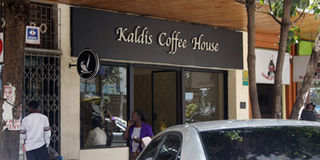Coffee bars sprout along Nairobi streets

PHOTO | PHOEBE OKALL Kaldis coffee house along Kimathi street in Nairobi is the latest entrant in the city.
What you need to know:
- Formerly a preserve of a few, outlets offering the beverage now dot the capital
For a decade, fresh brewed coffee retailing was a preserve of the few wealthy and foreigners despite the fact that Kenya is among the world’s top producers of the crop.
Times have changed. Coffee bars have sprouted on almost every street in Nairobi, with splendid lounges and cosy interiors.
Kaldis along Kimathi Street is the latest entrant, claiming a share of patrons who used to troop to the nearby Gibsons and Savanna.
“The directors of the firm saw an opportunity in Nairobi with the rising number of residents taking up coffee. Coming from America, they saw a gap in the way coffee is brewed and lack of serenity in the coffee joints, so they joined the fray,” said Ms Winnie Wambui, a consultant for Kaldis who also acts as the company’s spokesperson.
Kaldis is barely two months old but the management is registering a growing clientele, which is rare for startups.
“We were given a target for business pick-up, which was not to exceed six months. The business picked up from the onset, which is encouraging,” said Mr Mike Mwangi, the outlet’s manager.
“The coffee shop borrows from Ethiopia’s theme and has no correlation with the global Kaldis’ investments that dot the coffee retail industry,” said Ms Wambui.
“Three gentlemen found the idea of a coffee shop appealing and invested a lot in this premises. They wanted the interiors and standards to match international standards and agreed on their choice for Kaldis because of the character’s legend,” she said.
The popular myth is told of a goat herder named Kaldis who lived in Ethiopia. Also a poet, the herder one day apparently started daydreaming and reciting poetry as the goats wandered away.
Upon realisation what had happened, he roamed afar and found the goats on the hillsides. The animals were behaving in a strange way, dancing wildly around a shiny dark leafed shrub with red berries. Exhausted and famished from the search, Kaldis ate some of the berries and found himself dancing merrily with the goats.
“He carried some of the berries to the monastery and somehow, they fell in fire and started to produce an enticing aroma. He picked up the roasted beans gathered from the embers, ground them, and dissolved the powder in hot water, producing the world’s first cup of coffee. We are living by those standards,” said Ms Wambui.
Nobody would have predicted the success of coffee shops in Kenya. Mr Jon Wagner dallied with the idea in 1999 when he introduced Java.
Java now boasts 14 coffee shops around Nairobi, one in Mombasa, and another in Nakuru’s Westside Mall. The firm produces an average 1,500 cups of coffee a day.
A coffee exporter, C. Dorman, joined the fray in 2003 by opening a shop at Village Market, Gigiri. The firm now has seven outlets in Nairobi and one in Mombasa.
Sasini Tea and Coffee Limited, one of the top six coffee exporters in the country, invested Sh100 million in the Savanna outlets in 2007.
The coffee drinking fad is driven by the young middle-class consumers with a knack for entrepreneurship.




